Day two of ESI’s Digital Spring conference focused on various commercial opportunities, such as brand partnerships, the sector’s online offerings, activating esports fans, and broadcasting rights.
Fueled once again by a soundtrack provided by Game Ready Music, stellar production by High Viz Media Group, and hosted on the networking platform Brella — over eight hours of live content streamed throughout the day. Here is ESI’s recap of the day’s topics.
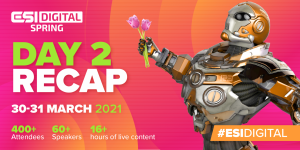
However, if you missed Day One’s recap. Click here to read what happened!
Monetising online offerings in esports
Day Two of ESI Digital Spring kicked off with a discussion on monetising online offerings in the esports industry. A particular highlight from the panel came when the topic of esports saturation was brought up.
When discussing if there is a worry of oversaturating esports, especially with the rise of online tournaments and activations, John Fazio, the Founder and CEO of Nerd Street Gamers commented: “What we’re doing is creating fandom and celebrity and growth in a way that we haven’t seen anything even close to yet.

“If it feels saturated now that might be game-specific, community-specific, but what’s coming is a size of market growth that’s going to make what we see now feel like nothing.”
Moreover, Gregory Bolle, NICECACTUS’s Chief Revenue Officer, believed that saturation in esports, at this moment in time, can only be positive for the industry.
“Saturation, I think it’s great. That’s proof that there is a massive mass market that is rich, and the more there is saturation, the better,” Bolle said.
Riot Games’s Business Development Manager, Romain Bigeard, also opened up about how the publisher built its ecosystem, highlighting that monetisation should not be prioritised to ensure long term success.
He explained: “I think we spent the first five to six years to create the ecosystem without monetisation of business being connected to it so we created the best show possible for the fans. We injected hundreds of millions across the years to make sure the ecosystem existed and was solid.”
Is chess an esport?

Inspired by the noticeable uptick of pieces exploring the same question, the panel ‘Checkmate. Is Chess an esport?’ began by asking whether chess is big enough, in terms of software size, to be considered in the same category as traditional titles. Andrew Peterman, the Chief Content Officer of Envy Gaming answered “Software is small, art is big. That’s the general rule with games.”
The following discussion covered how important the audience experience is to successfully broadcast (e)sporting events. Kaja Snare, Sport Director of Play Magnus Group suggested that online chess could implement more features as seen in esports titles broadcasts to decrease the mental distance between the viewers and players.
Then, the ultimate question was asked. Is Chess an esport?
Danny Rensch, Chief Chess Officer of Chess.com, said: “Is [chess] an esport? Maybe it doesn’t have to be. Chess is the most individual sport in the world. What’s most important is the top players are relatable, and I think chess is not an esport yet but there’s some way to go and we’ll be working more and more on this. Short answer though is chess an esport? No, I don’t think so.”
Head of Operations at TSM, Walter Wang asked: “Why put chess in a box and why put esports in a box? In the end, what are we all trying to do? We’re trying to bring out the tension, the excitement, the passion and the entertainment of competition. We all play in the attention economy, we’re trying to vye for eyeballs and we’re trying to create entertainment.”
In the end, chess seemingly has a symbiotic relationship with esports, with both benefiting from interactive broadcasting platforms, operating in physical/digital aspects and creating ‘edutainment’ for audiences.
ESI’s Brand Showcases featuring NSE and OpTic
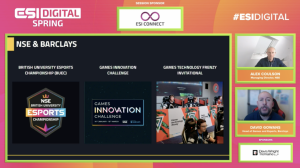
The first Brand Showcase of the day featured the official body of UK university esports NSE and British financial services company Barclays. Opening the presentation, Alex Coulson, NSE’s Managing Director, explained: “Last year, we had about 12,000 matches played and what that means now is that esports, on university campuses, is the most played sport — [more] than traditional sport — in terms of matches played.”
He added: “[NSE] has a really core passionate, active playing community gives you a lot of opportunities for data and research, both qualitative and quantitative, to kind of test what you’re doing, and see if it is working.” He shared that the community benefits from the support that they get from their partnership with Barclays.
David Gowans, Barclyas’s Head of Games and Esports, explained that Barclays’s position with NSE gives them the added opportunity to help students coming out of the university scene and moving into the professional industry, with the company’s entrepreneurial network and co-working spaces.
Gowans said of the partnership, “It’s about knowing that we can add value and help and support. It’s not about sponsorship, it’s a true partnership. And being constantly surprised by the other opportunities for us to be able to help solve problems, connect with students industry with business-building solutions.”
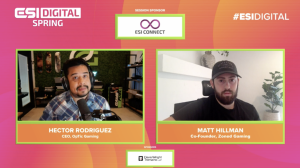
The second Showcase was OpTic Gaming and gaming chair maker MAVIX. The discussion focused on the authenticity of partnerships and the importance of trust between fans, brand, and content creators in the space.
Responsible for the MAVIX marketing campaign, Matt Hillman, Co-Founder of Zoned Gaming, detailed the importance of working with authentic members of the gaming and esports community to help bring the MAVIX brand to market.
Hillman acknowledged that MAVIX was a new brand entering the space and the help of established and authentic influencers in the gaming community helped the brand tremendously.
OpTic Gaming CEO, Hector Rodriguez, also spoke about being approached by brands and the importance of being transparent, Rodriguez said: “One of best things we’ve done is we talk upfront. We can be almost corporate. But you have to allow us to use our voice so it doesn’t feel like an ad.
“On our channel, in our universe, we have the responsibility to tell [potential partners] at the door: ‘this isn’t gonna work.’ We can avoid all of that at the inception. This is the smartest fanbase on the internet; they gamify everything, including looking at the best deals.”
What all of the ESI Digital Spring Brand Showcases have highlighted is that enthusiasm and cooperation between partners is a major factor in making these collaborations successful. Whether it’s between non-endemics, new brands, or institutions, the clear goal is that the partnership makes sense and adds value to all stakeholders.
Fan engagement and fandoms

The ‘Fan Engagement in esports: Tips, tricks, and tech’ panel featured a variety of great discussions. The speakers shared many ideas behind their products and experiences in fueling their esports community’s enthusiasm.
CEO & Co-founder of 3D Aim Trainer, Miquel Matthys, spoke about the unique data application possibilities in esports, said: “Imagine how cool it would be if you as a small kid, five years old, could be able to compare how hard you can kick a ball, versus Ronaldo if that’s your favourite player. I mean, that’s not possible, but it would be awesome.
“You can ask any kid and they would love to know that if you could give them a ball they could kick it and it would scream out the number, how hard they kick it versus Ronaldo — they would love it. And within this digital sports, esports, all of that is possible, which basically makes it a lot more engaging.”
Meanwhile Flyquest’s CEO, Tricia Sugita, discussed the esport organisation’s ‘quest’ initiative and its importance to the community. “At Flyquest, we try to make sure that everything we do comes with action […] The previous [quests] were all things that Flyquest led by example, and tied to our competitive success. We raised money, we made fan engagement fun, where [fans] are rooting for something more.”
Daniel Evans, CEO & President of REELY / Rocketreel added” “I feel like we’ve been really well received because we have the best intention of trying to lift up and grow the community and being a champion for the community. If you see [the community] as a really great tribe of [diverse] people and we just want to be a part of their journey […] I think you’ll be really well received.
During the last panel of ESI Digital Spring, ‘Esports teams and fandoms: Memberships, fan perks and loyalty points’ the speakers discussed the innovations, challenges and opportunities in fan engagement platforms.
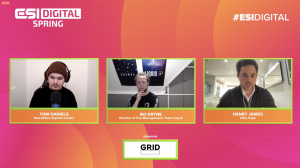
When discussing sign-ups and offerings for the Liquid+ platform, Bo Kryne, Director of Fan Management for Team Liquid said: “We tried to make it as easy as possible. There’s nothing [a fan] has to do, you can do plenty of things, and the more you do the more points you get. There are weekly and daily challenges, there are all kinds of quests you can do, but if [a fan] wants none of that — then that’s perfectly fine.”
Henry James, CEO & Founder of Espo, also commented: “From the perspective of the teams, this is their opportunity in my mind, to show their community, how we are here for you. We are here to listen to you. We’re here to reward you”
On offering fan engagement platforms, James added, “I think that this is the opportunity to really offer unparalleled access to your organisation and embrace the fact that we have a very digitally savvy audience in front of us.”
Broadcasting, rights holders and esports investment
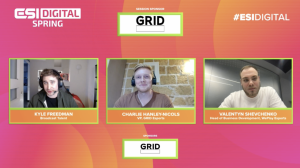
GRID Esports and WePlay Esports came together on a panel concerning maximising fan engagement for rights holders. Charlie Hanley-Nickolls, VP of GRID Esports commented: “Performance data in esports is live and official in its high granularity. If s1mple hits his 10,000th headshot and it pops up right away, that’s performance data. The difference to big data is that it’s not about mass personal data, it’s focused on the game.”
WePlay Esports’ Head of Business Development, Valentyn Shevchenko, also stressed that data doesn’t just have to be in the background, but can also play a part in broadcasts. He said, “If we’re talking about data, not just from the game but viewership as well, that can be integrated into broadcast […] and right now in esports it’s a lot easier to obtain game data than in traditional sport.”
The variety of data that is collectable can prove to be especially impactful for brands when matched with the right solutions for impactful application of the data. This becomes increasingly important as esports becomes more popular and investment prices rise.
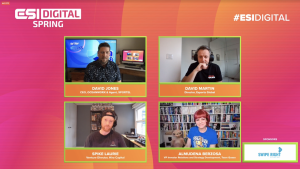
The ‘Investment in esports, 2021’ panel explored what types of returns could be expected to be generated in the near future.
Venture Director of Hiro Capital, Spike Laurie, said: “Obviously you need to return on investment and that’s coming because the video games industry is a particularly hot space, esports is driving a lot of that. And there are a lot of great nascent opportunities to get in at the ground floor.”
Coming from an organisation’s perspective, Almudena Berzosa, VP Investor Relations & Strategy Development for Team Queso, added: “The main driver of revenue in esports is ultimately coming from businesses that are centred around the fun. So if you want to generate substantial revenue, you have to ask yourself: ‘who owns that fun relationship?’ Which my answer, clearly are the teams.”
Finally, David Martin, Director of Esports Global, also commented on teams with invested capital behind them. “Most teams are on investment rounds and seeking to show validation of their investment money. Sometimes that leads to wrong choices in terms of brand sponsorship partnerships in terms of what they do, because it can mean sometimes that you’re chasing the number.”
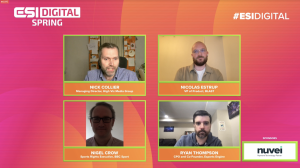
During the ‘Broadcast wars: The esports production landscape 2021’ panel, Nigel Crow, Sports Rights Executive for BBC Sport, spoke on the company’s decision to broadcast the League of Legends esports UKLC. Despite the competition being the second division of the UK league of legends ecosystem, Crow stated that “One of the main things we took away was the incredibly passionate fanbase.”
Ryan Thompson, CPO and Co-Founder of Esports Engine discussed the importance of finding the correct structure for broadcast. He said: “So much of it comes down to the competitive structure, for most events we’re running through a season in a week or a weekend. Esports is very good about finding the best team, we’re almost always in a double elimination plus round robin plus et cetera.
“We play a lot. The more you play the more you are able to find the best team and that’s great, but that’s not great for entertainment.”
Going deeper into the nuances of esports broadcast, Nicolas Estrup, VP of Product for BLAST also commented: “We want to make the broadcast entertaining for fans, viewers and everyone watching while also making it consumable. It needs to have a balance.”
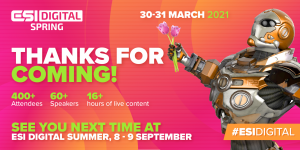
With the first digital event of 2021 in the bag, the team is greatly looking forward to the return of our physical events, which the team is quietly optimistic will make a comeback later this year. ESI’s digital event calendar year is as follows: ESI Digital Summer, slated for the beginning of September, and ESI Digital Winter at the start of December.

